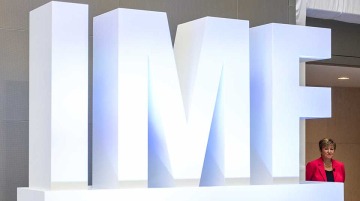
By Tim Hirschel-Burns and Marina Zucker-Marques
The International Monetary Fund’s (IMF) governance is increasingly out of step with today’s world. While emerging market and developing economies (EMDEs), including China, account for 60 percent of global gross domestic product (GDP), they hold just 40 percent of the IMF’s voting power. Reform is past due: The last time the IMF could agree on a redistribution of voting power was in 2010.
Rather than accelerating reform, the IMF is delaying it. At the recent 2025 IMF/World Bank Spring Meetings, the IMF quietly pushed back a deadline for making progress on reforming the institution’s governance. That June 2025 date—itself a compromise after a round of negotiations ended in 2023 without agreement on changing the distribution of voting power—is now set for April 2026.
At the heart of the IMF governance discussion lies IMF quotas, which should be reviewed every five years, according to the IMF Articles of Agreement. Quotas determine multiple core functions at the IMF: voting power, borrowing thresholds, Special Drawing Rights distributions, and the overall resourcing of the IMF. The lack of quota reform threatens the IMF’s legitimacy, limits its efficacy, and increases demand for alternatives.
A new report from the Boston University Global Development Policy Center shows that increasing the voice and representation of EMDEs will require a package of reforms, including a new quota formula and an increase in the “basic votes” equally distributed to all countries.
A central cause of quota gridlock is the China-sized elephant in the room. Under the current formula, China’s share of quotas would increase enormously: from its current 6.4 percent to 14.6 percent, within touching distance of the 15 percent veto threshold. That formula would also put the U.S. share of quotas below 15 percent. This situation derives from China’s huge economic growth since 2010, not from pro-China bias in the IMF. After all, it was the veto-wielding U.S. that drove the design of the current formula. If that formula were implemented, China would have twice the voting power it has now.
However, the IMF’s quota formula does not automatically take effect, so quota shares are effectively frozen in 2010. The US can use its existing veto to block the formula’s application; therefore, there is little likelihood that it will ever be applied. On top of that, the current formula would decrease quota shares for many developing countries, including the most vulnerable.
Reforms that are both meaningful and politically feasible must achieve several goals that are challenging—but not impossible—to reconcile: preserving the US veto, increasing China’s quota share and increasing the share of EMDEs other than China.
Our new research shows two ways to achieve this. First, it proposes a simplified new formula that consists of just two variables—GDP and variability—and increases the weight of the compression factor. (In measuring GDP, it also would give greater weight to purchasing power parity than the current formula.) Second, IMF members should agree to increase the weight of basic votes as part of a broader package of reform. Basic votes are particularly beneficial for smaller economies.
Summary: Voting Power Under the Status Quo and Under Different Reform Scenarios

Like all IMF members, China should not let the perfect be the enemy of the good. Global North countries could try to play China and other developing countries against each other. Quota reform that consisted solely of increasing basic votes would increase power for developing countries but would decrease the quotafor China. Global South countries could also grow frustrated with China if controversy over China’s power in the IMF continues to put all quota reform on hold. A much better approach would be to push for a modest increase in China’s quotas to reflect its status in today’s economy, while simultaneously pushing for reforms that would increase power in the IMF for developing countries more broadly.
The IMF’s continued delays mean that its credibility as a multilateral institution—and not just an instrument of US foreign policy—is skating on the thinnest of ice. While achieving quota reform will not be easy, our research shows it is not the impossible gridlock some make it out to be. There is a way forward, and IMF members must take it.
Tim Hirschel-Burns is the Policy Liaison for the Global Economic Governance Initiative at the Boston University Global Development Policy Center. Follow him on X: @TimH_B.
Marina Zucker-Marques is a senior academic researcher for the Global Economic Governance Initiative at the Boston University Global Development Policy Center. Follow her on X: @MarinaZucker.







